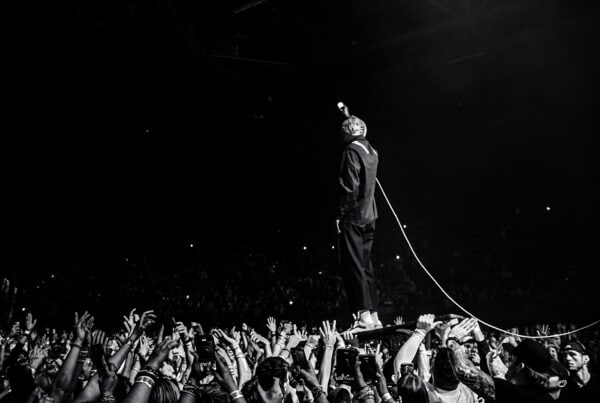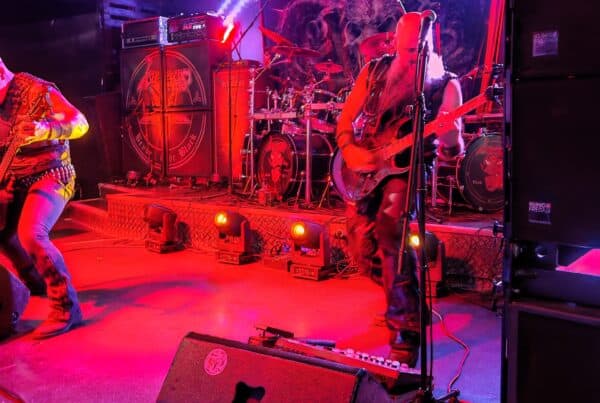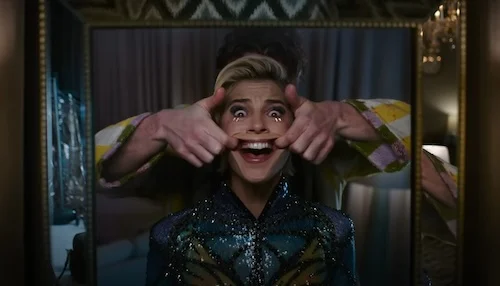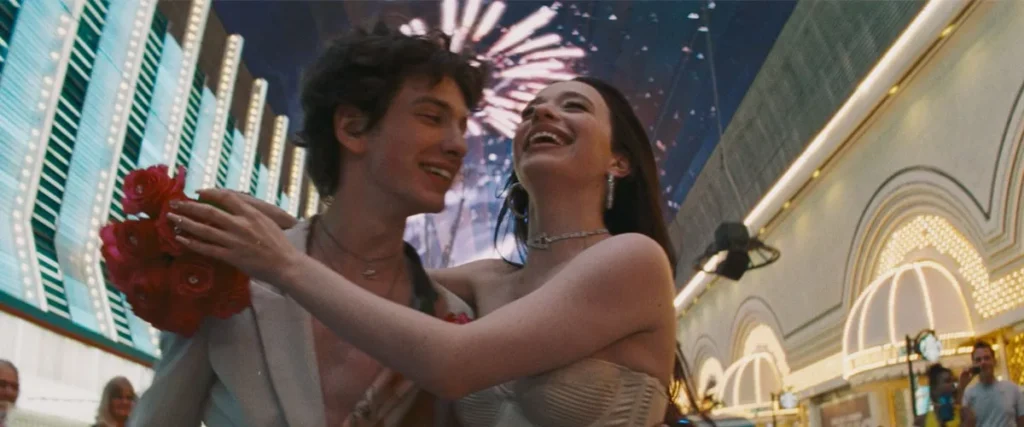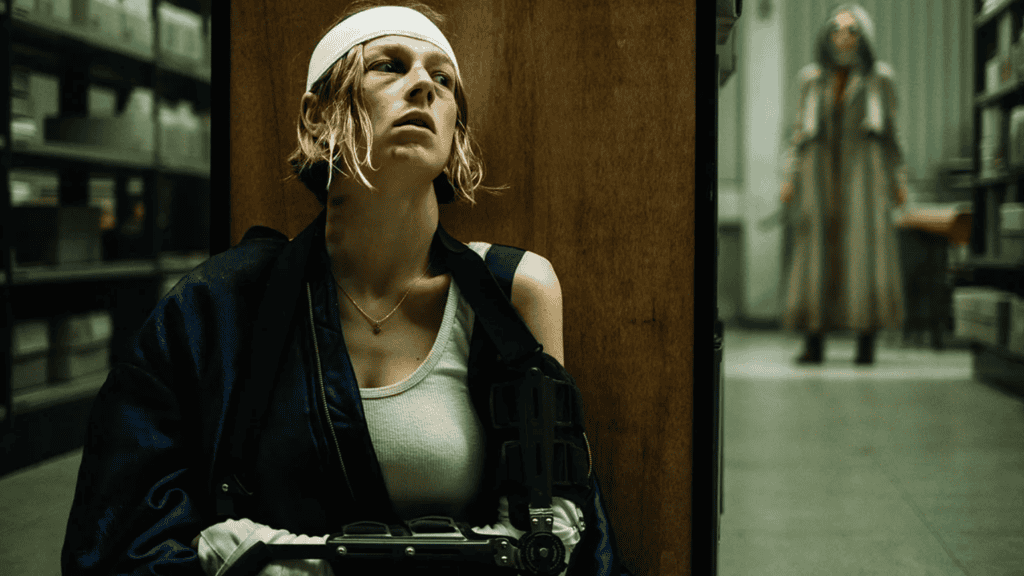At the beginning of 2019’s “Zombieland: Double Tap,” the film’s fourth-wall breaking narration strikes a tone that’s both wry and earnest: “You have a lot of choices when it comes to zombie entertainment,” it observes. It’s a comment that would seem positively bizarre just 20-odd years ago, before numerous artists in film, comics, television and more sought to resurrect their fond childhood memories of George A. Romero films, Italian horror rip-offs and gonzo splatter comedies, causing the zombie to become as much of a cultural mainstay as vampires, ghosts and werewolves.
Now that we’re well past the zombie revival phenomenon, we’ve entered a sort of post- post-modern phase when it comes to the living dead. It’s no longer novel to make a ribald zombie comedy, and the most predominant metaphors and allegories concerning the creature have been nearly done to death. Unless the zombie lays dormant for a while, there may not be much new to say about or with them.
Yet pushing the envelope in the arts and entertainment isn’t paramount; if it were, we wouldn’t have sequels and remakes and reboots and the like. What counts for a lot is sincerity, and that’s a quality that the film collective known as RKSS has in abundance. RKSS — Quebeckers individually known as François Simard, Anouk Whissell, and Yoann-Karl Whissell — first burst onto the scene with 2015’s “Turbo Kid,” a feature that showcased their geek culture bonafides as well as their penchant for combining the wholesome with the gruesome.
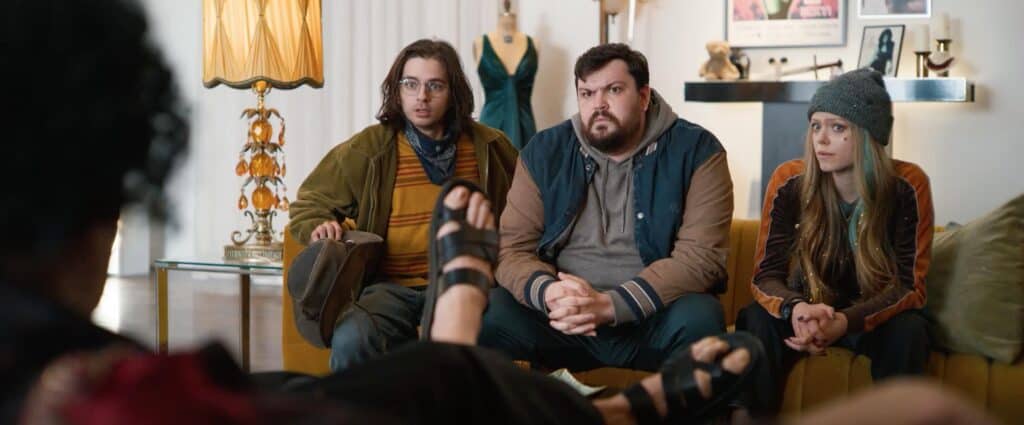
Their follow-up, “Summer of ’84,” took an impressive turn into genuinely dark territory, indicating that they may be adding some compelling maturity to their work going forward. Their first feature since then, “We Are Zombies,” pumps the brakes on that idea. But no matter; even though the film is, with its adult protagonists, ironically more juvenile than their first two films about children were, it’s still a charming zom-com romp.
Based on the comic series “The Zombies That Ate the World” by Jerry Frissen, “We Are Zombies” sees RKSS (who have jumped back on writing duties here for the first time since “Turbo Kid”) employ their clever economy when it comes to world building, explaining with just a short opening credits montage the idea that the dead have started coming back to life, but instead of turning into ravenous flesh-eating ghouls, they simply wander (or sit) around, taking up space.
They are, in effect, a new minority population, and although they’re given basic rights (including being referred to as the “Living Impaired”), humans are becoming perturbed by their growing numbers. To try and address that, officially licensed groups offering “retirement services” offer to take rotting loved ones off people’s hands. Seeing as how living corpses can fetch a good price on the black market, some enterprising people choose to hack into official systems and pose as retirement servicemen, and this is exactly what Freddy (Derek Johns), Karl (Alexandre Nachi), and Karl’s half-sister Maggie (Megan Peta Hill) do.
Unfortunately, this misfit trio finds their get-rich-quick grift beset on many sides, namely by the actual servicemen they’re stealing zombie pickups from: Stanley (Patrick Abellard) and Rocco (Marc-André Boulanger), who work for the Coleman corporation. Hannity (Benz Antoine), a former military man and current Coleman head honcho, refuses to pay Stanley and Rocco until they repay the company their debts, eventually leading the doofus duo to kidnap Karl and Maggie’s sweet old grandmother (Clare Coulter) as collateral until the black market trio can scrounge up some money.
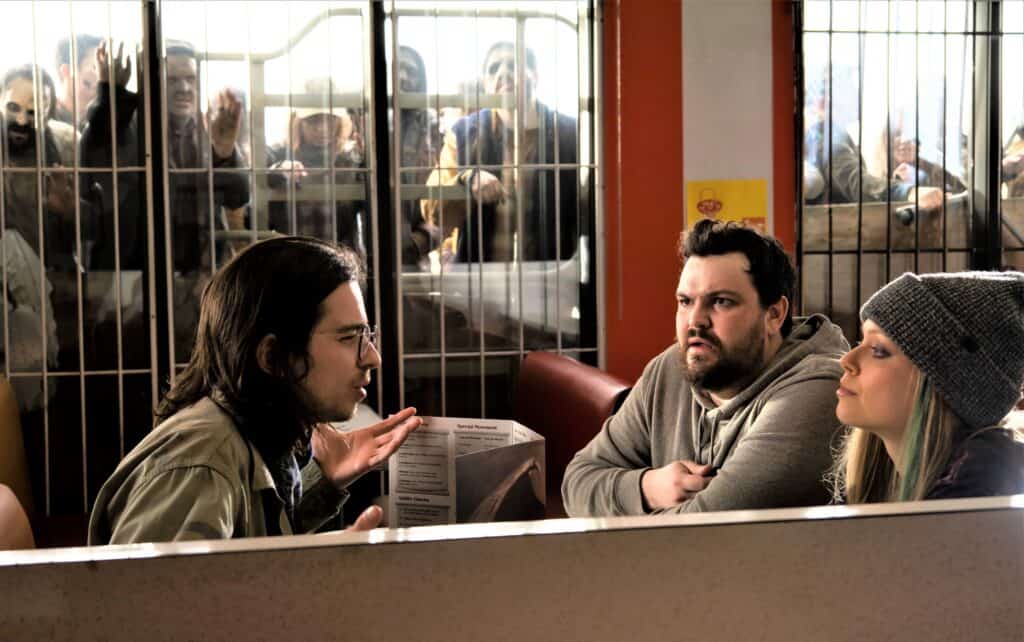
In order to do that, Karl uses a connection to get a job from an avant-garde artist/musician (Stéphane Demers), who wants them to literally dig up a celebrity Living Impaired to have as his date. Meanwhile, Hannity is making waves at Coleman, insisting that the Living Impaired population is growing too large, and begins planning to unleash an experimental chemical which will turn the LI into ravenous zombies and lead to, he hopes, the elimination of all the undead.
The comic book origins of “We Are Zombies” are present in all of this world building, and it isn’t too hard to see how a series (be it comic, film, or TV) could be spun off from it. Yet RKSS aren’t so craven as to position the film as part one of several. Instead, the movie is firmly focused on being a Coen Brothers-esque caper, as our so-called heroes make as many mistakes as they have victories.
Unlike the work of the Coens, there isn’t a ton of satiric bite to be found here; the slacker-humor dialogue is only edgy if you’re still a teenager, and some of the script’s attempts to be politically incorrect feel more feeble than sharp. Still, the idea that zombies and humans are both highly foolish (with humans edging out zombies in stupidity) is potent enough to lend the film a nice undercurrent of misanthropy.
Where “We Are Zombies” really shines is in its display of RKSS’ mix of ribald humor, violence, and open-hearted charm. Many of the hallmarks of the directing trio’s work can be seen in the film: nerd culture being openly celebrated, a badass blonde girl (who’s verbally referred to as such), a penchant for set-ups and pay-offs, the slick cinematography of Jean-Philippe Bernier (as well as his synthwave music, along with Jean-Nicolas Leupi, under the name of Le Matos), and so on.
There aren’t any standout performances as with RKSS’ previous films, but the ensemble as a whole works really well together, especially when tasked with selling various romantic couplings that are a little half-baked (which the script comments on, to its credit). More than anything, the movie feels genuinely personal, an increasingly rare thing in a media landscape saturated with zombie entertainment: it’s no coincidence that Karl, Freddy and Maggie are essentially the three filmmakers’ alter egos. To paraphrase “Zombieland: Double Tap,” you have a lot of choices when it comes to new zombie movies, and if you choose “We Are Zombies,” you’re at least likely to have a good time.
Soundsphere Rating: ![]()

